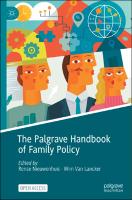The Palgrave Handbook of Family Policy
Contributor(s)
Nieuwenhuis, Rense (editor)
Van Lancker, Wim (editor)
Language
EnglishAbstract
This open access handbook provides a multilevel view on family policies, combining insights on family policy outcomes at different levels of policymaking: supra-national organizations, national states, sub-national or regional levels, and finally smaller organizations and employers. At each of these levels, a multidisciplinary group of expert scholars assess policies and their implementation, such as child income support, childcare services, parental leave, and leave to provide care to frail and elderly family members. The chapters evaluate their impact in improving children’s development and equal opportunities, promoting gender equality, regulating fertility, productivity and economic inequality, and take an intersectional perspective related to gender, class, and family diversity. The editors conclude by presenting a new research agenda based on five major challenges pertaining to the levels of policy implementation (in particular globalization and decentralization), austerity and marketization, inequality, changing family relations, and welfare states adapting to women’s empowered roles.
Keywords
Children, Youth and Family Policy; Sociology of Family, Youth and Aging; Sociology of Work; Social Policy; Formal childcare; Defamilization; Paid parental leave; Employment; immigration; marketisation; fiscalisation; globalisation; Open access; Central / national / federal government policies; Sociology: family & relationships; Sociology: work & labourDOI
10.1007/978-3-030-54618-2Publisher
Springer NaturePublisher website
https://www.springernature.com/gp/products/booksPublication date and place
2020Imprint
Palgrave MacmillanClassification
Central / national / federal government policies
Sociology: family and relationships
Sociology: work and labour


 Download
Download Web Shop
Web Shop